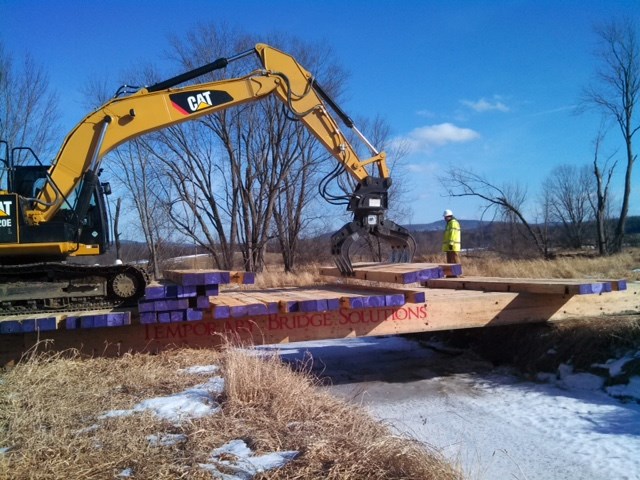Marsha Smoke is coming north with a unique business proposition.
The president of Moccasin Trails Engineered Road Access Matting Solutions has a keen interest in First Nation communities benefitting from development on their traditional territories.
Smoke’s company is a First Nation-owned provider of industrial matting and portable bridges for construction sites.
Often used in oil and gas work in Western Canada, it’s a relatively new product in this region but one that potentially offers real value when used in environmentally sensitive areas.
“My trips to the North are more about education than opportunities at this point,” said Smoke, a member of Alderville First Nation, located in the Rice Lake area, southeast of Peterborough.
The hardwood and softwood mats are used as work platforms to support heavy equipment, such as cranes or drill rigs, in accessing rugged and swampy terrains. They're also used on farmland and private property.
The mats are interlocking and range in size from 10 to 60 feet long and can weigh a couple of thousand pounds.
They’re deployed to minimize soil disturbance – such as rutting and compaction – and act as protective barriers against any material that might contaminate the ground. Once removed, the land returns to its natural state.
Smoke and her half-dozen employees don’t do any actual manufacturing from their Roseneath, Ont. offices. That’s for the simple reason of not wanting to manage an inventory to keep a workforce employed year-round.
Instead, the company buys new and used mats from major mat manufacturers, with whom they place orders and make arrangements for delivery to a job site somewhere in the U.S. or Canada, usually within days.
“In the matting business, there is no wait time," said Smoke.
Her network extends into the Amish country of Ohio and Pennsylvania, where she works with 30 small family-run businesses.
“I phone in the requirements and they start building. When the product is ready, I buy it off of them and resell them to the market.”
In keying on powerline and pipeline work, mining and access roads, Smoke wants to replicate the same business arrangement in Northern Ontario.
Smoke, the former owner of a travel agency and an Indigenous politician, admitted she had difficulty wrapping her head around this business opportunity when it was first presented to her a few years ago.
“I have gone my whole life talking about First Nations having to benefit from any work going on in our territories. Selling a mat didn’t cut it for me.”
The industrial matting business is ultra-competitive.
Suppliers frequently engage in bidding wars over contracts, often undercutting each other on mat prices. Where they make up the revenue is in offering a turnkey solution.
"The companies that manufacture the mats want to install them. That’s the lucrative part of matting. They can make between $35 to $40 for installing and pulling out a mat."
A project like the Wataynikaneyap (Watay) Power project in northwestern Ontario would, conservatively, require about 200,000 mats.
If turned twice – installed and taken away – that's around $28 million in revenue, said Smoke.
Instead, Smoke decided to turn that business model on its head by having a First Nation contractor or a community do the installation.
“I don’t want to take a piece of the pie on the install. That doesn’t make any sense to me.”
Moccasin Trails provides the trainer and will offer to act as project manager, at the company's cost.
The company has already made inroads into Northern Ontario as a supplier for the Henvey Inlet wind farm near Sudbury, on powerline projects in Pikangikum and Temagami, and for a Union Gas project in Sudbury.
Smoke confirmed her company is a bidder on the Watay Power project and is eyeballing participating in the proposed Northwest Bulk Transmission Line, west of Thunder Bay. To that end, she has made the rounds to most of those communities along these corridors.
“I’m on the ground floor talking to First Nations already,” said Smoke, who hopes to secure a First Nation-owned forestry company to be her mat supplier.
“We already have the demand. We just need the supply.”




